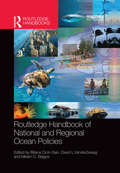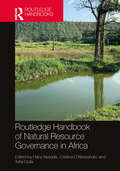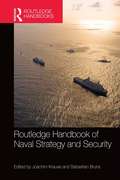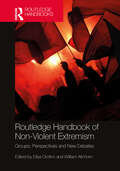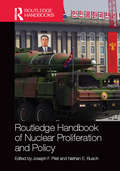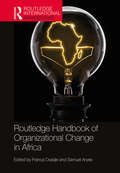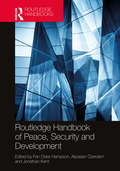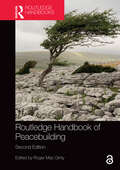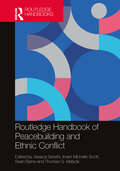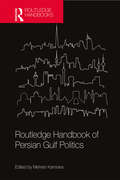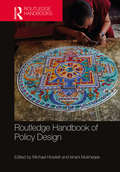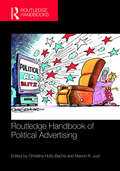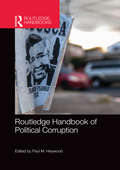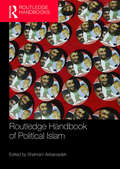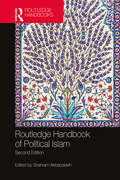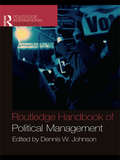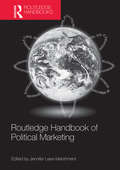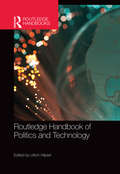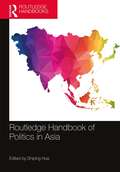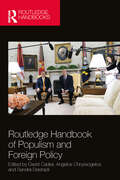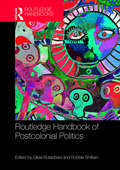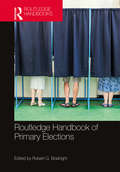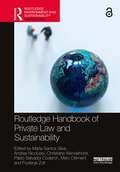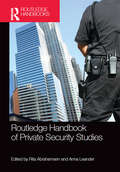- Table View
- List View
Routledge Handbook of National and Regional Ocean Policies (Routledge Environment and Sustainability Handbooks)
by Biliana Cicin-Sain, David L. VanderZwaag, and Miriam C. BalgosThis comprehensive handbook, prepared by leading ocean policy academics and practitioners from around the world, presents in-depth analyses of the experiences of fifteen developed and developing nations and four key regions of the world that have taken concrete steps toward cross-cutting and integrated national and regional ocean policy. All chapters follow a common framework for policy analysis. While most coastal nations of the world already have a variety of sectoral policies in place to manage different uses of the ocean (such as shipping, fishing, oil and gas development), in the last two decades, the coastal nations covered in the book have undertaken concerted efforts to articulate and implement an integrated, ecosystem-based vision for the governance of ocean areas under their jurisdiction. This includes goals and procedures to harmonize existing uses and laws, to foster sustainable development of ocean areas, to protect biodiversity and vulnerable resources and ecosystems, and to coordinate the actions of the many government agencies that are typically involved in oceans affairs. The book highlights the serious conflicts of use in most national ocean zones and the varying attempts by nations to follow the prescriptions emanating from the 1982 UN Law of the Sea Convention and the outcomes of the 1992, 2002, and 2012 sustainable development summits. The interrelationship among uses and processes in the coast and ocean requires that ocean governance be integrated, precautionary, and anticipatory. Overall, the book provides a definitive state-of-the-art review and analysis of national and regional ocean policies around the world.
Routledge Handbook of Natural Resource Governance in Africa
by Hany Besada, Cristina D’Alessandro and Tefsi GollaThe Routledge Handbook of Natural Resource Governance in Africa provides a comprehensive analysis of African natural resource governance, stretching across the continent, and encompassing water, land, extractive resources, and mining.Africa’s natural resources are not only crucial for the continent from an economic, environmental, and political perspective, but they are also of significant geopolitical importance, with direct implication for meeting the global challenges outlined in the Sustainable Development Goals. Whether an abundance of natural resources proves to be a curse or a blessing depends on the nature, extent, and outcome of the effort and experience of an individual country in governing and managing such assets. It is with this in mind that this ground-breaking handbook brings together experts from across the field of natural resource development to reflect on the varied regime types and paradigms within the continent’s natural resource sectors, the specific challenges they face, and their role within global value chains. The book first considers governance for sustainable development and discourses of land and development financing, before going on to investigate the regulatory and policy impacts, and socioeconomic implications of natural resource management. Finally, the Handbook situates the African continent within the emerging global energy transition; examining trends in South-South cooperation, and new frontiers for the harnessing of critical tools in a sustainable future for natural resource governance and management.Overall, the Handbook’s in-depth analysis provides a unique blend of realism and optimism, highlighting the importance of building a new sustainable African resource narrative for shared prosperity. The handbook will be an essential read for researchers and policy makers with an interest in sustainable development and natural resource governance in Africa.
Routledge Handbook of Naval Strategy and Security
by Sebastian Bruns Joachim KrauseThis new handbook provides a comprehensive overview of the issues facing naval strategy and security in the twenty-first century. Featuring contributions from some of the world’s premier researchers and practitioners in the field of naval strategy and security, this handbook covers naval security issues in diverse regions of the world, from the Indian Ocean and the Mediterranean to the Arctic and the piracy-prone waters off East Africa’s coast. It outlines major policy challenges arising from competing claims, transnational organized crime and maritime terrorism, and details national and alliance reactions to these problems. While this volume provides detailed analyses on operational, judicial, and legislative consequences that contemporary maritime security threats pose, it also places a specific emphasis on naval strategy. With a public very much focused on the softer constabulary roles naval forces play (such as humanitarian assistance, disaster relief, naval diplomacy, maintenance of good order at sea), the overarching hard-power role of navies has been pushed into the background. In fact, navies and seapower have been notably absent from many recent academic discussions and deliberations of maritime security. This handbook provides a much-desired addition to the literature for researchers and analysts in the social sciences on the relationship between security policy and military means on, under, and from the sea. It comprehensively explains the state of naval security in this maritime century and the role of naval forces in it. This book will be of much interest to students of naval security and naval strategy, security studies and IR, as well as practitioners in the field.
Routledge Handbook of Non-Violent Extremism: Groups, Perspectives and New Debates
by William Allchorn Elisa OrofinoThis Handbook provides the first in-depth analysis of non-violent extremism across different ideologies and geographic centres, a topic overshadowed until now by the political and academic focus on violent and jihadi extremism in the Global North. Whilst acknowledging the potentiality of non-violent extremism as a precursor to terrorism, this Handbook argues that non-violent extremism ought to be considered a stand-alone area of study. Focusing on Islamist, Buddhist, Hindu, far-right, far-left, environmentalist and feminist manifestations, the Handbook discusses the ideological foundation of their ‘war on ideas’ against the prevailing socio-political and cultural systems in which they operate, and provides an empirical examination of their main claims and perspectives. This is supplemented by a truly global overview of non-violent extremist groups not only in Europe and the United States, but also in Africa, Asia, Oceania and the Middle East. The Handbook thus answers a call to decolonise knowledge that is especially prescient given both the complicity of non-violent extremists with authoritarian states and the dynamic of oppression towards more progressive groups in the Global South. The Handbook will appeal to those studying extremism, radicalisation and terrorism. It intersects several relevant disciplines, including social movement studies, political science, criminology, Islamic studies and anthropology.
Routledge Handbook of Nuclear Proliferation and Policy
by Joseph F. Pilat Nathan E. BuschThis new Handbook is a comprehensive examination of the rich and complex issues of nuclear proliferation in the early 21st century. The future of the decades-long effort to prevent the further spread of weapons of mass destruction is at a crossroads today. If international nonproliferation efforts are to be successful, an integrated, multi-tiered response will almost certainly be necessary. A serious, thorough, and clear-eyed examination of the range of threats, challenges, and opportunities facing the international community is a necessary first step. This Handbook, which presents the most up-to-date analysis and policy recommendations on these critical issues by recognized, leading scholars in the field, intends to provide such an examination. The volume is divided into three major parts: Part I presents detailed threat assessments of proliferation risks across the globe, including specific regions and countries. Part II explains the various tools developed by the international community to address these proliferation threats. Part III addresses the proliferation risks and political challenges arising from nuclear energy production, including potential proliferation by aspiring states and nonstate groups. This Handbook will be of great interest to students and practitioners of nuclear proliferation, arms control, global governance, diplomacy, and global security and IR general.
Routledge Handbook of Organizational Change in Africa (Routledge International Handbooks)
by Franca Ovadje Samuel AryeeAlthough change management and therefore effective adaptation to environmental complexity is considered a uniquely human cultural activity, the extensive change management literature is largely based on the experiences of organizations in the advanced economies of the West. As the economies of African countries become increasingly open, African organizations will need to be agile in order to adapt and grow in a dynamic, global environment. Currently, there is a dearth of contextualized knowledge on change management within Africa, but this handbook aims to address this by bringing together a wide range of experts to explore organizational change and change management from an African context. The handbook adopts a multidisciplinary (historical, philosophical, processual, and strategic) perspective as well as empirical accounts of change management. It addresses such issues as: What are the external and internal pressures for change? What is the content and process of change management? What are the essentials of effective change management? How can change management be theorized from an African perspective? What sort of leadership can best align with change management demands in an African context? How do organizations build internal change management capability? It is hoped that answers to these questions contained in the handbook will provide a contextualized understanding of change management which African organizations and scholars can leverage to respond to the threats and opportunities inherent in their increasingly dynamic environment. The handbook should constitute an essential reference for academics, researchers, and advanced students of change management, development studies, and African studies, as well as practitioners.
Routledge Handbook of Peace, Security and Development
by Fen Osler HampsonThis Handbook offers a comprehensive examination of the peace, security, and development nexus from a global perspective, and investigates the interfaces of these issues in a context characterised by many new challenges. By bringing together more than 40 leading experts and commentators from across the world, the Handbook maps the various research agendas related to these three themes, taking stock of existing work and debates, while outlining areas for further engagement. In doing so, the chapters may serve as a primer for new researchers while also informing the wider scholarly community about the latest research trends and innovations. The volume is split into three thematic parts: Concepts and approaches New drivers of conflict, insecurity, and developmental challenges Actors, institutions, and processes. For ease of use and organisational consistency, each chapter provides readers with an overview of each research area, a review of the state of the literature, a summary of the major debates, and promising directions for future research. This Handbook will be of much interest to students of peace and conflict studies, development studies, security studies, and International Relations.
Routledge Handbook of Peacebuilding
by Roger Mac GintyThis new Routledge Handbook offers a comprehensive, state-of-the-art overview of the meanings and uses of the term ‘peacebuilding’, and presents cutting-edge debates on the practices conducted in the name of peacebuilding. The term ‘peacebuilding’ has had remarkable staying power. Other terms, such as ‘conflict resolution’ have waned in popularity, while the acceptance and use of the term ‘peacebuilding’ has grown to the extent that it is the hegemonic and over-arching term for many forms of mediation, reconciliation and strategies to induce peace. Despite this, however, it is rarely defined and often used to mean different things to different audiences. Routledge Handbook of Peacebuilding aims to be a one-stop comprehensive resource on the literature and practices of contemporary peacebuilding. The book is organised into six key sections: Section 1: Reading peacebuilding Section 2: Approaches and cross-cutting themes Section 3: Disciplinary approaches to peacebuilding Section 4: Violence and security Section 5: Everyday living and peacebuilding Section 6: The infrastructure of peacebuilding This new Handbook will be essential reading for students of peacebuilding, mediation and post-conflict reconstruction, and of great interest to students of statebuilding, intervention, civil wars, conflict resolution, war and conflict studies and IR in general.
Routledge Handbook of Peacebuilding
by Roger Mac GintyThis updated and revised second edition of the Routledge Handbook of Peacebuilding contains cutting-edge analyses of contemporary attempts to reach and sustain peace.The book covers the main actors and dynamics of peacebuilding, as well as the main challenges that it faces, with accessible chapters. The volume is comprehensive, covering everything from the main international institutions for peacebuilding to the links between peacebuilding and climate change, or peacebuilding and trauma. It is also firmly interdisciplinary, with a number of chapters devoted to showcasing how different disciplines interpret peacebuilding and how they contribute to it. Bringing together leading thinkers and practitioners on peacebuilding, many from the Global South, the handbook offers a valuable “hands-on” perspective on how peace can be secured and sustained. There is a significant emphasis on comparison and the book shows how peacebuilding is best examined from the vantage point of multiple cases.The book is organised into six thematic sections:Part I: Architecture and ActorsPart II: Reading PeacebuildingPart III: Issues and ApproachesPart IV: Violence and SecurityPart V: Everyday LivingPart VI: Disciplinary ApproachesThis book will be essential reading for students of peacebuilding, mediation and post-conflict reconstruction, and of great interest to students of statebuilding, intervention, civil wars, conflict resolution, war and conflict studies and IR in general.Chapter 25 of this book is freely available as a downloadable Open Access PDF at http://www.taylorfrancis.com under a Creative Commons Attribution (CC-BY) 4.0 license.
Routledge Handbook of Peacebuilding and Ethnic Conflict
by Sean Byrne Imani Michelle Scott Jessica Senehi Thomas G. MatyókThis handbook offers a comprehensive analysis of peacebuilding in ethnic conflicts, with attention to theory, peacebuilder roles, making sense of the past and shaping the future, as well as case studies and approaches. Comprising 28 chapters that present key insights on peacebuilding in ethnic conflicts, the volume has implications for teaching and training, as well as for practice and policy. The handbook is divided into four thematic parts. Part 1 focuses on critical dimensions of ethnic conflicts, including root causes, gender, external involvements, emancipatory peacebuilding, hatred as a public health issue, environmental issues, American nationalism, and the impact of the COVID-19 pandemic. Part 2 focuses on peacebuilders’ roles, including Indigenous peacemaking, nonviolent accompaniment, peace leadership in the military, interreligious peacebuilders, local women, and young people. Part 3 addresses the past and shaping of the future, including a discussion of public memory, heritage rights and monuments, refugees, trauma and memory, aggregated trauma in the African-American community, exhumations after genocide, and a healing-centered approach to conflict. Part 4 presents case studies on Sri Lanka’s postwar reconciliation process, peacebuilding in Mindanao, the transformative peace negotiation in Aceh and Bougainville, external economic aid for peacebuilding in Northern Ireland, Indigenous and local peacemaking, and a continuum of peacebuilding focal points. The handbook offers perspectives on the breadth and significance of peacebuilding work in ethnic conflicts throughout the world. This volume will be of much interest to students of peacebuilding, ethnic conflict, security studies, and international relations.
Routledge Handbook of Persian Gulf Politics
by Mehran KamravaThe Routledge Handbook of Persian Gulf Politics provides a comprehensive and up-to-date analysis of Persian Gulf politics, history, economics, and society. The volume begins its examination of Ottoman rule in the Arabian Peninsula, exploring other dimensions of the region’s history up until and after independence in the 1960s and 1970s. Featuring scholars from a range of disciplines, the book demonstrates how the Persian Gulf’s current, complex politics is a product of interwoven dynamics rooted in historical developments and memories, profound social, cultural, and economic changes underway since the 1980s and the 1990s, and inter-state and international relations among both regional actors and between them and the rest of the world. The book comprises a total of 36 individual chapters divided into the following six sections: Historical Context Society and Culture Economic Development Domestic Politics Regional Security Dynamics The Persian Gulf and the World Examining the Persian Gulf’s increasing importance in regional politics, diplomacy, economics, and security issues, the volume is a valuable resource for scholars, students, and policy makers interested in political science, history, Gulf studies, and the Middle East.
Routledge Handbook of Policy Design
by Michael Howlett Ishani MukherjeeUniting theoretical bases and advancements in practice, the Routledge Handbook of Policy Design brings together leading experts in the academic field of policy design in a pioneering effort of scholarship. Each chapter provides a multi-topic overview of the state of knowledge on how, why, where or when policies are designed and how such designs can be improved. These experts address how a new emphasis on effective policy design has re-emerged in public policy studies in recent years and clarify the role of historical policy decisions, policy capacities and government intentions in promoting a design orientation towards policy formulation and policy-making more generally. They examine many previously unexplored aspects of policy designs and designing activities, which focus upon analyzing and improving the sets of policy tools adopted by governments to correct policy problems. Ranging from the fundamentals of policy design and its place in greater policy studies, to new questions regarding policy design content and effectiveness, to contemporary design trends such as the use of digital tools and big data, the Routledge Handbook of Policy Design is a comprehensive reference for students and scholars of public policy, public administration and public management, government and business.
Routledge Handbook of Political Advertising (Routledge International Handbooks)
by Marion R. Just Christina Holtz-BachaThis Handbook provides the most comprehensive overview of the role of electoral advertising on television and new forms of advertising in countries from all parts of the world currently available. Thematic chapters address advertising effects, negative ads, the perspective of practitioners and gender role. Country chapters summarize research on issues including political and electoral systems; history of ads; the content of ads; reception and effects of ads; regulation of political advertising on television and the Internet; financing political advertising; and prospects for the future. The Handbook confirms that candidates spend the major part of their campaign budget on television advertising. The US enjoys a special situation with almost no restrictions on electoral advertising whereas other countries have regulation for the time, amount and sometimes even the content of electoral advertising or they do not allow television advertising at all. The role that television advertising plays in elections is dependent on the political, the electoral and the media context and can generally be regarded as a reflection of the political culture of a country. The Internet is relatively unregulated and is the channel of the future for political advertising in many countries
Routledge Handbook of Political Corruption
by Paul M. HeywoodSince the early 1990s, a series of major scandals in both the financial and most especially the political world has resulted in close attention being paid to the issue of corruption and its links to political legitimacy and stability. Indeed, in many countries – in both the developed as well as the developing world – corruption seems to have become almost an obsession. Concern about corruption has become a powerful policy narrative: the explanation of last resort for a whole range of failures and disappointments in the fields of politics, economics and culture. In the more established democracies, worries about corruption have become enmeshed in a wider debate about trust in the political class. Corruption remains as widespread today, possibly even more so, as it was when concerted international attention started being devoted to the issue following the end of the Cold War. This Handbook provides a showcase of the most innovative and exciting research being conducted in Europe and North America in the field of political corruption, as well as providing a new point of reference for all who are interested in the topic. The Handbook is structured around four core themes in the study of corruption in the contemporary world: understanding and defining the nature of corruption; identifying its causes; measuring its extent; and analysing its consequences. Each of these themes is addressed from various perspectives in the first four sections of the Handbook, whilst the fifth section explores new directions that are emerging in corruption research. The contributors are experts in their field, working across a range of different social-science perspectives.
Routledge Handbook of Political Islam
by Shahram AkbarzadehThe Routledge Handbook of Political Islam provides a multidisciplinary overview of the phenomenon of political Islam, one of the key political movements of our time. Drawing on the expertise from some of the top scholars in the world it examines the main issues surrounding political Islam across the world, from aspects of Muslim integration in the West to questions of political legitimacy in the Muslim world. Bringing together an international team of renowned and respected experts on the topic, the chapters in the book present a critical account of: Theoretical foundations of political Islam Historical background Geographical spread of Islamist movements Political strategies adopted by Islamist groups Terrorism Attitudes towards democracy Relations between Muslims and the West in the international sphere Challenges of integration Gender relations. Presenting readers with the diversity of views on political Islam in a nuanced and dispassionate manner, this handbook is an essential addition to the existing literature on Islam and politics. It will be of interest across a wide range of disciplines, including political science, Islamic studies, sociology and history.
Routledge Handbook of Political Islam
by Shahram AkbarzadehThis updated, second edition of the Handbook of Political Islam covers a range of political actors that use Islam to advance their cause. While they share the ultimate vision of establishing a political system governed by Islam, their tactics and methods can be very different. Capturing this diversity, this volume also sheds light on some of the less-known experiences from South East Asia to North Africa. Drawing on expertise from some of the top scholars in the world, the chapters examine the main issues surrounding political Islam across the world, including: Theoretical foundations of political Islam Historical background Geographical spread of Islamist movements Political strategies adopted by Islamist groups Terrorism Attitudes towards democracy Relations between Muslims and the West in the international sphere Challenges of integration Gender relations Capturing the geographical spread of Islamism and the many manifestations of this political phenomenon make this book a key resource for students and researchers interested in political Islam, Muslim affairs and the Middle East.
Routledge Handbook of Political Management
by Dennis W. JohnsonThe Routledge Handbook of Political Management is a comprehensive overview of the field of applied politics, encompassing political consulting, campaigns and elections, lobbying and advocacy, grass roots politics, fundraising, media and political communications, the role of the parties, political leadership, and the ethical dimensions of public life. While most chapters focus on American politics and campaigns, there are also contributions on election campaigns in Europe, the Middle East, Russia, Australia, East Asia, and Latin America. In addition to a thorough treatment of campaign and elections, the authors discuss modern techniques, problems, and issues of advocacy, lobbying, and political persuasion, with a special emphasis throughout the volume on technology, the Internet, and online communications as political tools. Grounded in the disciplines of political science, political communications, and political marketing, the Routledge Handbook of Political Management explores the linkages between applied politics and social science theory. Leading American and international scholars and practitioners provide an exhaustive and up-to-date treatment of the state of this emerging field. This publication is a major resource for advanced undergraduates, graduate students, and scholars of campaigns, elections, advocacy, and applied politics, as well as for political management professionals.
Routledge Handbook of Political Marketing
by Jennifer Lees-MarshmentWith the Obama campaign universally acknowledged as the most successfully marketed presidential campaign of all time, the future of political marketing is fiercely contested, provoking a wealth of high quality scholarship from across the globe. This work provides an accessible introduction to the field, international in both content and authorship, which will set the direction of future research. Routledge Handbook of Political Marketing contains cutting edge contributions written by academic experts and informed practitioners but will also have a cohesive structure, containing emerging areas and authors alongside established ones. The handbook addresses the practicalities as well as the broader impact of political marketing on politics including its’ role in the changing relationship between political leaders, parties and voters. With each chapter providing a comparative and carefully structured discussion of a key topic, the handbook examines issues within the following broad themes: Understanding the market, gathering ideas, and debate Product development, branding and strategy Internal Marketing Communicating and connecting with the public Government Marketing - delivery, policy and leadership With each chapter written to a common template presenting new research and contemporary case studies, the handbook combines a succinct presentation of the latest research with an accessible and systematic format that will be of great interest to scholars and practitioners alike.
Routledge Handbook of Politics and Technology
by Ulrich HilpertThis handbook provides a comprehensive global survey of the politics of technology. Written by an outstanding line up of distinguished scholars in the field, the handbook covers all aspects of the relationship between politics and technology including: Demand and support for new technologies and innovation by the state The effects of technology policies Technology development and innovation difference between various countries and regions Policy instruments and techno-industrial innovation Dynamism and change as outcomes of government policies Driving forces for science and innovative development Forming the basis of this handbook are examples of regional development, country studies and a rich variety of technologies, as well as topical issues such as divergent political interests in relation to technology and the economic exploitation of technologies. Employing a comparative and interdisciplinary approach in order to analyse the interplay between government activities and the development of new technologies, this handbook will be an invaluable resource for all students, scholars and practitioners working in the politics of technology, public policy and policy analysis.
Routledge Handbook of Politics in Asia
by Shiping HuaThe Routledge Handbook of Politics in Asia is designed to serve as a comprehensive reference guide to politics in Asia. Covering East, South, Southeast, and Central Asia, this handbook brings together the work of leading international academics to cover the political histories, institutions, economies, and cultures of the region. Taking a comparative approach, it is divided into four parts, including: A thorough introduction to the politics of the four regions of Asia from the perspectives of democratization, foreign policy, political economy, and political culture. An examination of the "Big Three" of Asia – China, India, and Japan – focusing on issues including post-Mao reform, China’s new world outlook, Indian democracy, and Japanese foreign policy. A discussion of important contemporary issues, such as human rights, the politics of the internet, security, nationalism, and geopolitics. An analysis of the relationship between politics and certain theoretical ideas, such as Confucianism, Hinduism, socialist constitutionalism, and gender norms. As an invaluable and all-inclusive resource, this handbook will be useful for students, scholars, researchers, and practitioners of Asian politics and comparative politics.
Routledge Handbook of Populism and Foreign Policy
by David Cadier Sandra Destradi Angelos ChryssogelosThis handbook provides a methodical, comprehensive, and unifying overview of the vibrant yet disparate scholarship on populism and foreign policy. By mapping the debates and existing findings, as well as presenting the different conceptual and theoretical lenses, the handbook provides new insights as to how, whether, and to what extent, populism influences foreign policy. Carefully selected international contributors connect their own work to others to offer a thorough, theoretically informed, and empirically tested academic treatment of the topic across a number of cases where populist actors are, or have been, in power. Divided into four parts (Concepts and Theories; Factors and Processes; Actors and Structures; Issues and Policy Areas), the diverse and comprehensive insights on the global, cross-regional, and transnational dimensions of populism will be of interest to scholars and students of international relations, political science, public policy, foreign policy, political theory, populism, and area studies. This text will also be of interest to those working from the perspectives of Sociology, Law, and History, as well as to the practitioners of international politics.
Routledge Handbook of Postcolonial Politics
by Robbie Shilliam Olivia U. RutazibwaEngagements with the postcolonial world by International Relations scholars have grown significantly in recent years. The Routledge Handbook of Postcolonial Politics provides a solid reference point for understanding and analyzing global politics from a perspective sensitive to the multiple legacies of colonial and imperial rule. The Handbook introduces and develops cutting-edge analytical frameworks that draw on Black, decolonial, feminist, indigenous, Marxist and postcolonial thought as well as a multitude of intellectual traditions from across the globe. Alongside empirical issue areas that remain crucial to assessing the impact of European and Western colonialism on global politics, the book introduces new issue areas that have arisen due to the mutating structures of colonial and imperial rule. This vital resource is split into five thematic sections, each featuring a brief, orienting introduction: Points of departure Popular postcolonial imaginaries Struggles over the postcolonial state Struggles over land Alternative global imaginaries Providing both a consolidated understanding of the field as it is, and setting an expansive and dynamic research agenda for the future, this handbook is essential reading for students and scholars of International Relations alike.
Routledge Handbook of Primary Elections
by Robert G. BoatrightPrimary elections have been used for the past century for most U.S. elective offices and their popularity is growing in other nations as well. In some circumstances, primaries ensure that citizens have a say in elections and test the skills of candidates before they get to the general election. Yet primaries are often criticized for increasing the cost of elections, for producing ideologically extreme candidates, and for denying voters the opportunity to choose candidates whose appeal transcends partisanship. Few such arguments have, however, been rigorously tested. This innovative Handbook evaluates many of the claims, positive and negative, that have been made about primaries. It is organized into six sections, covering the origins of primary elections; primary voters; US presidential primaries; US subpresidential primaries; primaries in other parts of the world; and reform proposals. The Routledge Handbook of Primary Elections is an important research tool for scholars, a resource guide for students, and a source of ideas for those who seek to modify the electoral process.
Routledge Handbook of Private Law and Sustainability (Routledge Environment and Sustainability Handbooks)
by Marta Santos Silva Andrea Nicolussi Christiane Wendehorst Pablo Salvador Coderch Marc Clément Fryderyk ZollThe Routledge Handbook of Private Law and Sustainability reflects on how the law can help tackle the current environmental challenges and make our societies more resilient to future crises.Sustainability has been high on the political agenda since the approval of the Sustainable Development Goals in 2015 and the EU Green Deal in 2019. The Green Agenda aims at making Europe the first climate‑neutral continent by 2050, but humanity persists in an ecological overshoot that puts at risk the survival of species, including that of our own. Drawing together a selection of leading thinkers in the field, this Handbook provides a curated overview of the most recent and relevant discussions for private lawyers related to environmental and sustainability concerns. The authors delve into case study examples from 20 countries in Europe and beyond and discuss a wide range of issues, including new property law and consumer law paradigms, the use of legal tech for promoting sustainable property management, strategies for fighting planned obsolescence, eco‑design, the servitisation economy, advances on corporate climate litigation and mandated green private sludges. Overall, the volume is designed to empower new generations of legal scholars to take an active role in the transition to a more sustainable future. It will also assist policymakers in producing better policy, through pinpointing the main legal issues that need to be addressed and offering a comparative overview of legal solutions and best practices.Divided into six key parts and overseen by a team of internationally recognised expert editors, this Handbook will be an essential resource for students, scholars, private lawyers and policymakers who wish to have a comprehensive, fundamental overview of how environmental sustainability concerns reflect on private law.
Routledge Handbook of Private Security Studies
by Rita Abrahamsen & Anna LeanderThis new Handbook offers a comprehensive overview of current research on private security and military companies, comprising essays by leading scholars from around the world. The increasing privatization of security across the globe has been the subject of much debate and controversy, inciting fears of private warfare and even the collapse of the state. This volume provides the first comprehensive overview of the range of issues raised by contemporary security privatization, offering both a survey of the numerous roles performed by private actors and an analysis of their implications and effects. Ranging from the mundane to the spectacular, from secretive intelligence gathering and neighbourhood surveillance to piracy control and warfare, this Handbook shows how private actors are involved in both domestic and international security provision and governance. It places this involvement in historical perspective, and demonstrates how the impact of security privatization goes well beyond the security field to influence diverse social, economic and political relationships and institutions. Finally, this volume analyses the evolving regulation of the global private security sector. Seeking to overcome the disciplinary boundaries that have plagued the study of private security, the Handbook promotes an interdisciplinary approach and contains contributions from a range of disciplines, including international relations, politics, criminology, law, sociology, geography and anthropology. This book will be of much interest to students of private security companies, global governance, military studies, security studies and IR in general.
